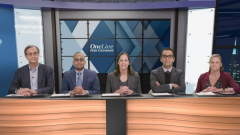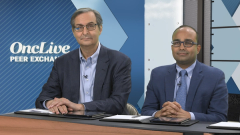
Combination IO/TKI Strategies in Metastatic Colorectal Cancer
A comprehensive review on combination strategies with immune checkpoint and tyrosine kinase inhibitors in patients with metastatic colorectal cancer.
Episodes in this series

Transcript:
Kristen K. Ciombor, MD: One other theme I think we’ve seen in microsatellite stable disease is trying combinations, so immunotherapy/TKIs [tyrosine kinase inhibitors], especially VEGF TKIs. Dr Raghav, tell us a bit about the LEAP-005 study and then its follow-up, LEAP-017, looking at lenvatinib andpembro [pembrolizumab].
Kanwal P. Raghav, MD: I think it’s one of the studies, but there are a lot of these studies, that build on the fact that TKIs are immunomodulators. It would be hard to find a drug that’s not an immunomodulator.
Kristen K. Ciombor, MD: Yes, true.
Kanwal P. Raghav, MD: But the immune system is affected to convert this immune-suppressive environment into an immune-permissive environment. The initial study that brought this forward was regorafenib and nivolumab. We saw responses in the initial study. We didn’t see as many responses in the United States population. But then we came to realize that maybe the responses are restricted to patients who have lung metastases. So LEAP was lenvatinib and pembrolizumab. Again, very similar principles, that VEGF inhibition and other mechanisms can improve T-cell trafficking and decreased T-regulatory cells. In this small, single-arm study, they did find a response rate of around 20%, which is what we’re talking about essentially, in most cases. And that formed the basis of a larger randomized trial. But again, I think we have to wait for how this turns out in a randomized setting because in a randomized setting you cannot subselect a population. We all know there is some truth to the idea that patients with good immune infiltrates are a positive prognostic sign. So by definition, if your patients are living long enough to participate in clinical trials, they should be more responsive to immunotherapy. But it’s still to be seen because the regorafenib and nivolumab randomized trial did not show us the outcomes that we want to see.
Kristen K. Ciombor, MD: Not as good as phase 1. Yes, exactly. How about another drug we see in oncology a lot, cabozantinib? What about the COSMIC-21 study, Dr Hecht? What did you think about that?
Joel R. Hecht, MD: All these drugs, once again, they’re not superimposable. TKIs, when you look at the kinome, you see the dots on the kinome, they all hit different things. When it’s toxicity, we call them dirty kinase inhibitors because mostly we were trying to hit VEGF originally. If it’s important, it’s a multitargeted agent. So it all depends. It’s not a bug, it’s a feature. All of these have, whether it’s rego [regorafenib] or sorafenib, which is one atom different than regorafenib, whether it’s lenvatinib or cabozantinib, or other variants I think will be talked about like XL092, all of them are a little different. They hit, and I think you said it exactly right, everything theoretically has some interaction with the immune system. The question is whether those are clinically important.
There have been some studies with cabozantinib, and once again in combination, if I remember correctly this was with a PD-L1. What they showed was in that same 20% ballpark of responses, where we know that a PD-L1 by itself should have pretty close to 0%. Carefully selected patients, patients who are alive for these trials, not necessarily the people who go on a large randomized phase 3. We talked about the liver, and there was something else about this and the similar drug, XL092, that there seemed to be differences in whether there was a RAS mutation or not. We do know, and in fact, our colleagues at UCLA [University of California, Los Angeles] and Edward Garon, [MD,] in our lung group has spent a lot of time because they’re certainly doing immunotherapy, and RAS is also important, and looking at interactions between RAS and basically responses and other parts of immunotherapy in lung cancer. So it wouldn’t be shocking obviously that RAS makes a difference.
But at least in these trials, once again that sort of 20%, I think it’s interesting enough to do these. The question is, do you stratify so you don’t throw the baby out with the bathwater by the site of metastases? Do you have molecular? And in some trials, that’s what they’re doing. Most of these trials are in the salvage setting. And as we know from this week’s meeting, the standard of care in the salvage setting is a moving target as well.
Kristen K. Ciombor, MD: Absolutely.
Pashtoon M. Kasi, MD: I wonder, as you mentioned, not all TKIs are the same. The fact that you had a tail with some signal in the RAS/RAF wild-type, knowing the MET has…resistance to anti-EGFR….
Joel R. Hecht, MD: They do all hit MET.
Pashtoon M. Kasi, MD: Cabo [cabozantinib] as you know, does hit MET…and I wonder if that’s playing into the immune modulation as well or….
Joel R. Hecht, MD: As opposed to, no, and that’s the problem. You can’t peel these things out.
Kanwal P. Raghav, MD: I think there’s a lack of good preclinical models for immunotherapy. Therefore, these studies are a dime a dozen. You can combine anything with anything. But you also have to look at the holistic approach offered because we only talk about how we are modulating these things inside the tumor. But now you’re not treating somebody like with chemotherapy, you’re treating somebody who’s even more dependent on the tumor microenvironment, the knowledge of which is far less than what we know about our tumor types. I think it’s a complex problem. I think Dr Hecht put it really well, we don’t know how it’s working, but something’s happening.
Joel R. Hecht, MD: It’s one of these iterative processes where you hope that it works, and it’s the same thing with bal [balstilimab] and bot [botensilimab]. It’s easy, there are some thoughts, but what you really want is, first you have to see responses, and then you work backward.
Kristen K. Ciombor, MD: We’ve done that in other things too, RAS and anti-EGFR.
Joel R. Hecht, MD: I think it also argues for the need. When I started we were giving anti-EGFR antibodies, some of the early panitumumab trials that I did with your colleague, Jordan Berlin, [MD]. That was before we knew about RAS as a resistance mechanism. But I think one of the things it argues for is the need for a robust translational program with all of these. These trials are big, they’re expensive. We owe our patients that. I think that biopsies are still important since you mentioned tumor microenvironment, which is something, as much as we talked about ctDNA [circulating tumor DNA] at the beginning, sometimes you just need a piece of the tumor to look at it to see if it correlates with anything.
Pashtoon M. Kasi, MD: As a side note, as an investigator, what’s refreshing about both the early MOUNTAINEER study and CAMILLA, is they all sprung out as investigator-initiated trials.
Joel R. Hecht, MD: They were, yes.
Pashtoon M. Kasi, MD: That led to a signal that led to the academic/industry partnership.
Joel R. Hecht, MD: And CAMILLA in particular, [Anwaar] Saeed, [MD], is working with me. I’m the PI [principal investigator] on the STELLAR-303 trial, and she’s the co-PI, and it comes from looking at this. I think it’s important to say that as difficult as investigator-initiated trials are, they often are important. Both of the trials also did have translational correlative end points, which are informing RAS and things like that.
Transcript edited for clarity.







































